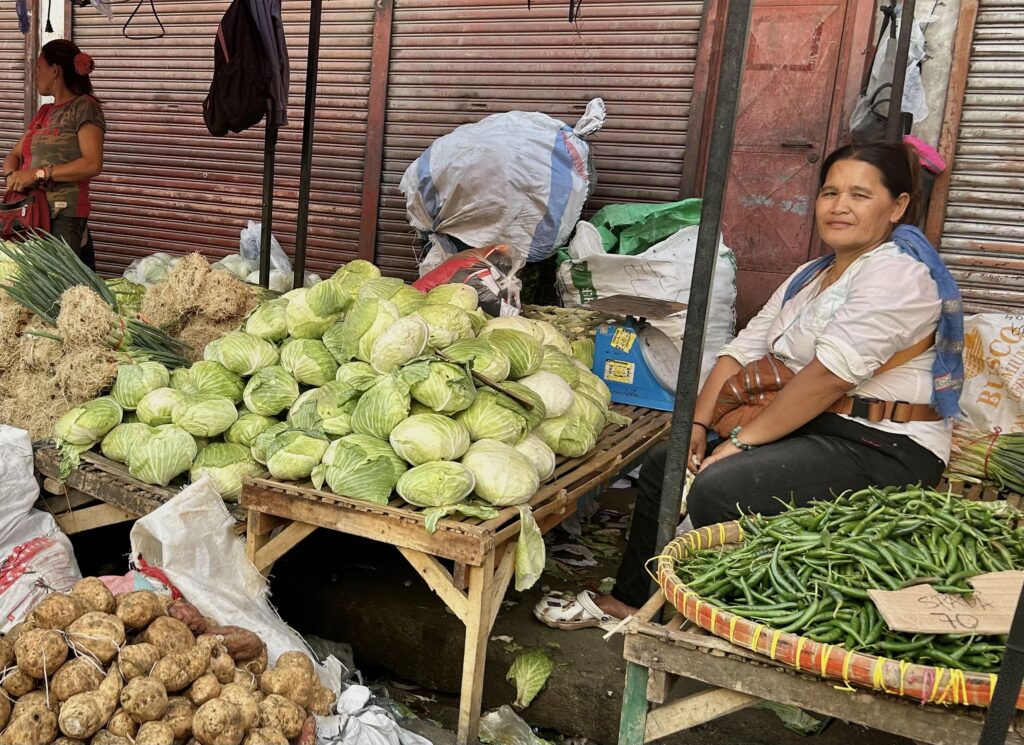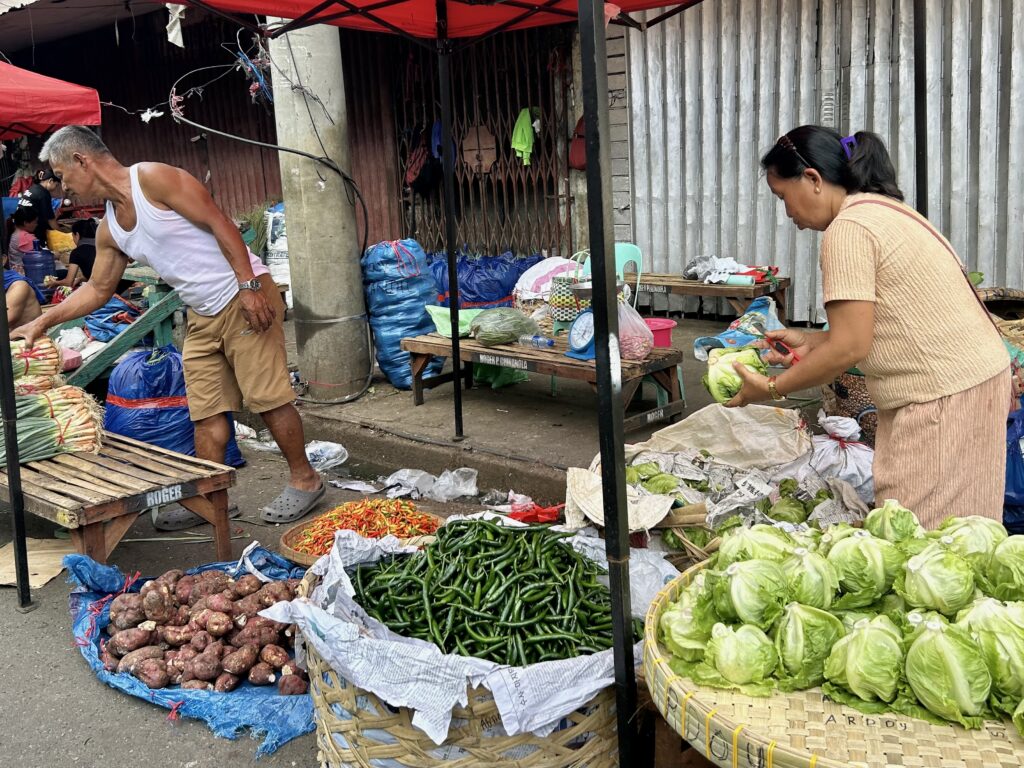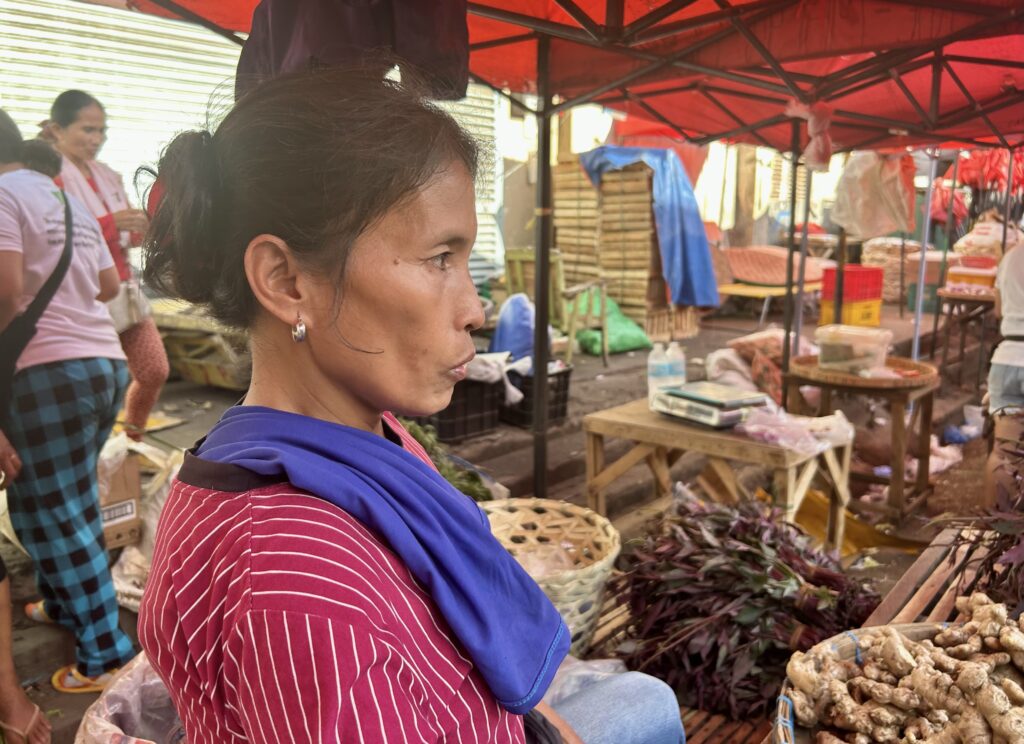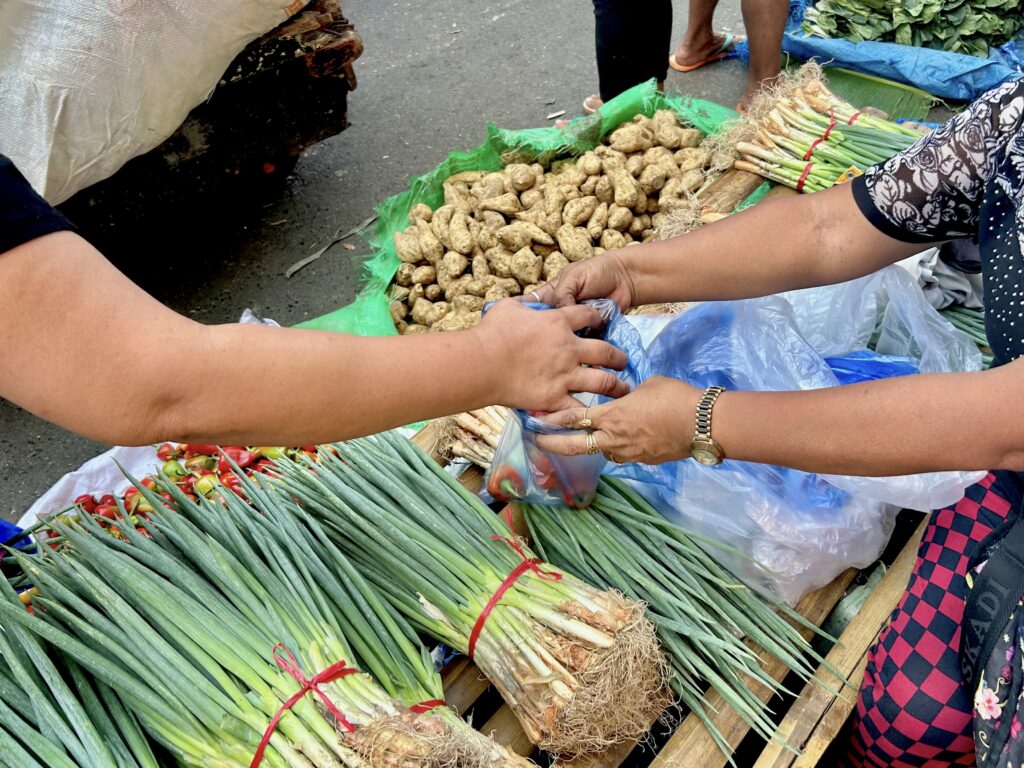Impact of extreme heat: soaring prices as vegetable supply drops, vendors fear for livelihood

Many vendors at the Carbon Public Market, like Maria Gemma Calvo, are grappling with a crisis caused by the decreasing vegetable supply due to intense heat and water scarcity in recent times. | CDN photo/ Emmariel Ares
CEBU CITY, Philippines – Lera Daral is a regular shopper at Carbon Public Market in Cebu City. Every week, she joins countless others in buying groceries, especially vegetables.
The market, known as the oldest and largest in Cebu City, is bustling with stalls offering various products and services. Besides shopping for her family, Daral also sells these items at her own stall to make a profit.
Lately, she’s been grappling with the rising prices of vegetables. Though she still goes to the market often, she can’t ignore how the higher prices are hitting her hard as a shopper.
“Apektado uy. Pero palit jud mi, no choice gyud kay kinahanglanon man sad,” stated Daral.
Many locals in Cebu City, like Daral, are unhappy about the recent rise in vegetable prices, which is straining their grocery budgets. This problem isn’t limited to consumers, though.
Vegetable vendors in the city, such as 51-year-old Maria Gemma Calvo, are also facing challenges. Calvo has been selling vegetables like cabbage and potatoes from Dalaguete town since 2010. Twice a week, she travels from Dalaguete to Cebu City to set up her stall during the early hours of the day, managing it alone until she sells all her produce.
In recent months, her business has suffered because the vegetable supply at the market is decreasing due to soaring temperatures.
Since the start of summer, Cebu has experienced dangerously high heat indexes, sometimes reaching up to 38 degrees Celsius. This intense heat, combined with irregular water supply, is reducing crop yields and causing crops to wilt.
As a result, there’s less produce available, making it difficult to meet the high demand for vegetables during the summer. On days when she’s not at the market, Calvo and her husband cultivate various vegetables.
Since February, their harvests have been decreasing due to the increasing temperatures.
Calvo explained that her hometown, like many places in Dalaguete, has been experiencing water shortages for months. As a result, their crops don’t last as long, leading to lower profits when they sell them at the market compared to before.
READ MORE: Extreme Heat as a ‘New Pandemic’: Thousands in PH Cancel Classes During ‘Hottest Year’

Ardoy and Marina Salunoy have been running their vegetable stall together on the streets of downtown Cebu City for 25 years. | CDN photo/ Emmariel Ares
Ardoy and Marina Salunoy, a married couple, are experiencing the same issue. Instead of their usual 10 baskets of vegetables, they now only get 2 to 3.
Vegetable prices rise
Like other vendors at Carbon, the couple, who’ve been in the business for 25 years, fear they may have to quit. To make ends meet, they’ve had to raise prices, despite complaints from customers.
“Grabe na nagkalisod ang mga tanom. Naa nay di na maharvest gani. Ang mga dahanon, naay uban wa nay dahon,” stated Ardoy.
Their green chili peppers now cost P80 per kilo, up from P70, while lettuce is priced at P80 per kilo and sweet potatoes at P35. The couple explained that prices fluctuate weekly based on their bulk purchases at Mantalongon Public Market.
Marina expressed concern that if the weather continues as it is, they may run out of vegetables to sell in the coming weeks. If that occurs, they’ll have to find another way to support their family.
“Apektado jud among paninda. Labi na ang mga tawo pud diri, mangita og makaminos. Kami mopatol na lang sa pâtong 10-15. Kanang makakobra tag mahal, ig-abot diri di na mahal. Wa na, alkansi,” added another vendor, 61-year-old Elvira Quibido.
Quibido stated that she has to justify the price hikes to her customers because her expenses for buying products, transportation, and labor need to be covered. Despite understanding her buyers’ concerns, offering lower discounts wouldn’t cover these costs.
Vendors attribute the vegetable supply issue in Cebu to the heat and water crisis. Some vendors buy produce, while others grow and harvest their crops themselves.

Joselyn Cosido worries about keeping her crops alive until harvest time due to inadequate water supply. | CDN photo/ Emmariel Ares
Joselyn Cosido, 50, grows vegetables at her home in Barangay Sirao, Cebu City, and sells them at the city market every Sunday.
She’s been doing this for over 20 years to support her five children, two of whom are still in school. Cosido explained that she has fewer vegetables to sell now because her small farm is suffering due to the water shortage in their community.
“Naa pa juy gamay. Makaingon jud kog gamay kay karon lagi, kung makatigom usa ka baril ba or og di kaabot, ugma naman. Amo bana-banaon nga makaigo nag bubo sa tanom, ginagmay ra gyud kay amo man giagad ang tubig. Pero anbot kung makasuporta pa ba na kung way tubig uwan. Luoy kaayong mangumahay,” she stated.
In their mountain barangay, where most residents are farmers, securing enough water to sustain their crops until harvest time is becoming increasingly challenging.
She explained that in their community, there’s a creek where they can access water using a gasoline-powered pump. However, the high cost of gasoline makes it unaffordable for many, limiting their ability to use the machinery regularly. Instead, she conserves the little water she can obtain when she occasionally uses the pump for household needs and watering plants.
READ MORE: Extreme heat in PH: Health risks, economic impact
However, she’s unsure if she can keep tending to her crops if the high temperatures persist into next month.
“Mao jud akoa problema, unsaon na lang kung pananglitan ibutang sa Mayo og wa guy uwan, mag unsa na mi. Wala na mi panginabuhian. Mao nay amo ginaproblemahan gyud,” stated Cosido.
Farmers and vendors hope for rain to arrive soon to provide the necessary moisture for their crops and soil to thrive. Despite their hopeful wishes, authorities forecast that the temperature rise due to El Niño will continue into the next month.
The Philippine Atmospheric, Geophysical, and Astronomical Services Administration (Pagasa) previously anticipated that the strong El Niño effect might diminish by the end of May. This news has alarmed vegetable vendors, who are concerned about how they will cope while the intense heatwave persists in Cebu.

Vendors at the Carbon market revealed that vegetable prices may rise in the coming weeks due to an expected supply shortage. | CDN photo/ Emmariel Ares
Many Carbon market vendors revealed that prices may keep rising in the coming weeks, with lettuce possibly reaching up to P300 per kilo. Some mentioned that vegetable supply will remain scarce as local farmers are facing reduced harvests.
The widespread and extreme heat across Asia is now jeopardizing the livelihoods of these vendors, who work tirelessly to support their families. In Cebu City, vendors are distressed and seek understanding from consumers as they strive to make a living under challenging conditions.
Overall, the sentiment among Carbon Public Market vendors is that this year’s summer season doesn’t look promising. /clorenciana
Disclaimer: The comments uploaded on this site do not necessarily represent or reflect the views of management and owner of Cebudailynews. We reserve the right to exclude comments that we deem to be inconsistent with our editorial standards.
